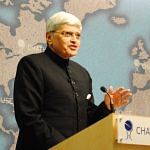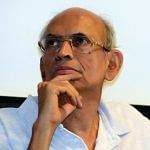 India must bow its head to Maharashtra on this day
India must bow its head to Maharashtra on this day
Gopal Krishna Gandhi | Former administrator, diplomat and governor
Hindustan Times
Gandhi explains why 19 February is Marathas’ day — because of three famous men: it’s Chhatrapati Shivaji birth anniversary. Second, it’s the death anniversary of Gopal Krishna Gokhale “who burned himself out trying to bring to India democratic rights, and republican obligations.” And finally, there’s Bal Gangadhar Tilak, “who brought Shivaji’s jayanti out of the dust of time and the haze of forgetting… by marking February 19 as a festival, an utsav.”
 How coronavirus is stalling China’s military modernisation plans
How coronavirus is stalling China’s military modernisation plans
Jayadeva Ranade | Former additional secretary in the Cabinet Secretariat. And current president, Centre for China Analysis and Strategy
Hindustan Times
Ranade explains that the coronavirus epidemic has hit the People’s Liberation Army’s recruitment drive, and stalled production at weapons manufacturing institutes.
“The impact of the virus in Wuhan, where it originated, will affect China’s defence production. Wuhan is home to many Chinese weapons and equipment design and manufacturing institutes.”
 A tale of two development models
A tale of two development models
Madhav Gadgil | Emeritus Scientist, National Centre for Cell Science, S.P. Pune University
Hindustan Times
Gadgil compares the two development models in Delhi and Goa. He calls the Aam Aadmi Party’s model, a caring development while Goa’s model as the arrogance of development.
“One may ask: Last year, the AAP spent on education and health care about a third of the Goa government’s gift of Rs 35,000 crore to guilty miners. What then will hurt India? The arrogant vikas in Goa, or the caring vikas in Delhi?”, he writes.
Upendra Baxi | Professor of law, University of Warwick, and former vice chancellor of South Gujarat University and Delhi University
The Indian Express
Baxi explains that the Supreme Court ruling in favour of women army officers is pathbreaking as the top court extends the arc of equality by destroying obstinate structures of gender-based discrimination in state and civil society.
“Justice Dhananjaya Y. Chandrachud and Justice Ajay Rastogi have ruled against the army and even gone so far as to characterise as ‘absurd’ all justifications for inequality on the grounds of security, discipline and morale of the forces,” he writes.
 Content of speech, or name of speaker?
Content of speech, or name of speaker?
Apoorvanand | Teaches Hindi at Delhi University
The Indian Express
Apoorvanand argues that even if we disagree with Sharjeel Imam’s comments, it is important to stand up for his right to speak.
“Sharjeel should not be left alone to fight this battle. To secure his liberty, to ensure equality for him, to guarantee justice to him — ideas of fraternity and solidarity need to assert themselves,” he argues.
Narayani Gupta | Historian
The Indian Express
Gupta states that the Modi government’s proposed Central Vista will destroy Delhi’s cultural landscape. She states that the current plan is like a “kaleidoscope”, which has some new modification every day. She argues that “a lack of respect for our past will create a cultural crater as deep as the new buildings are high.”
 The Centre could yet ride to the telecom sector’s rescue
The Centre could yet ride to the telecom sector’s rescue
Rahul Matthan | Partner at Trilegal and author of ‘Privacy 3.0: Unlocking Our Data Driven Future’
Mint
Matthan explains that the government must step in to help the ailing telecom sector, “just like it did in 1999”, by amending the license agreement. However, the “unpaid licence fees of the past, together with penalties and interest” will also need to be addressed, he adds.
 It’s evident that Kejrinomics is neither scalable nor replicable
It’s evident that Kejrinomics is neither scalable nor replicable
R. Jagannathan | Editorial director, ‘Swarajya’ magazine
Mint
Jagannathan explains that the “Delhi freebie culture” or “Kejriwalnomics” is a model that has stayed within fiscal limits only because “major heads of expenditure” like law and order and “chunks” of urban infrastructure are paid by the central government. Therefore, this model should not be a template for “poorer” states, he writes.
 Fix GST’s input credit problems
Fix GST’s input credit problems
Gokul Kishore | Advocate with Lakshmikumaran & Sridharan.
Financial Express
Kishore suggests “delinking payment of tax from return filing and making the GST portal glitch-free” to help initiate “recovery proceedings against taxpayers”. He criticises “rough edges in the new provisions” under the GST law and urges them to be “ironed out so that the compliant taxpayers are allowed to do business using rightfully earned tax credits without hassles.”
Ayesha Chaudhary | Program Director Atal Innovation Mission, NITI Aayog
Financial Express
Chaudhary discusses good governance at two levels—intrinsic and extrinsic. The former stems from the individual level in terms of “commitment to larger good, and other moral values”, while the latter is at the institutional level, such as “adoption of digital technology with the introduction of UIDAI, …performance indices” etc. Despite India launching a “Good Governance Index to rank Indian states, the search for good governance is an ongoing academic exercise”, she writes.
Seema Sirohi | Author
The Economic Times
With a party that is fractured, management “deeply worried” and supporters confused, Sirohi suggests that Democrats fear a “fate similar to Britain’s Labour Party”. By looking at the campaigns of Bernie Sanders, “wild card” Michael Bloomberg and “BJP friendly Congresswoman” Tulsi Gabbard and so on, she concludes that while “Democrats want to defeat Trump” but not all of them want a socialist to replace him.
Today’s Editorials
Hindustan Times: The daily analyses the recent incidents of difference in opinions between Congress leaders over various issues in ‘The anarchy in Congress’. It argues that this might suggest a form of internal democracy but political parties work on the basis of a degree of coherence and discipline. Furthermore, if there are grievances, the onus rests on the leadership to resolve them. HT notes that the absence of an honest, introspective, internal review after Congress’ loss in the Lok Sabha elections and weak top leadership are the main reasons for the crisis. This has caused anxiety among the party’s rank which, does not see a road map for the future.
The Hindu: In ‘Visa Power’, Hindu argues that it seems clear that the decision to revoke the visa of British MP Debbie Abrahams was prompted by her frequent criticism of India on the issue of human rights in Jammu and Kashmir. It notes that the boycott or deportation of politicians and visa denials to foreign journalists appear to be a part of a pattern of “whimsical behaviour not suited to a democracy like India that prides in its traditions of openness and debate”.
The Times of India: The Delhi election result reveals the difference between state and Lok Sabha elections. The Opposition has taken note of this as Bihar elections are eight months away, writes TOI. Tejashwi Yadav’s ‘Berozgari Hatao Yatra‘, and poll strategist Prashant Kishor ‘Baat Bihar Ki’ campaign can challenge the NDA-JDU coalition, it predicts. To ensure a campaign on their terms, Nitish and BJP’s Sushil Modi will have to strongly project NDA’s achievements.










